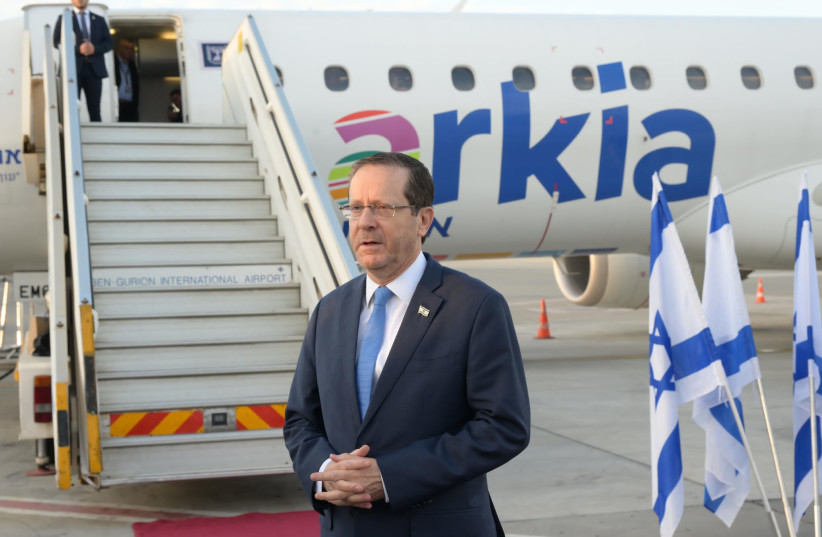President Isaac Herzog was made an honorary citizen of Herzliya at a ceremony on Monday at Herzliya City Hall, presided over by Mayor Moshe Fadlon and attended by council members.
Herzog said that he felt like a citizen of Herzliya, a city that is blessed because it bears the name of Zionist visionary Theodor Herzl. He was very familiar with Herzliya, he said. His parents had lived there for several years, and after his father passed away in April 1997, his mother, whom Herzog visited regularly, continued to live there until her death in January of this year.
Never be shy with questions
From Herzliya City Hall, Herzog and his wife Michal went on to the inauguration of Herzliya’s Kiryat Hinuch Chaim Herzog, an educational campus named for his father, Israel’s sixth president.
While there, the Herzog’s toured a “Wonderful World” exhibition created by school children who have been studying climate and existence. After that, they participated in a festive ceremony at the school that was also attended by Supreme Court President Esther Hayut.

Herzog told the children that they should never be embarrassed about asking questions and casting doubts until they receive a satisfactory answer. It was very important for him to say this in Hayut’s presence, he said, because her role is the pursuit of justice. This particular value was also important to his father, in relation to the State of Israel and the Jewish People, he said.
The Eli Cohen Museum
From there, they went to the inauguration of the Eli Cohen Museum that honors the memory of Israel’s master spy who was caught and executed in Syria, and whose remains Israel has tried for more than half a century to bring home – without success.
Prime minister-designate Benjamin Netanyahu promised Cohen’s widow Nadia that he would do all in his power to try to bring her husband’s remains to Israel for proper Jewish burial.
Netanyahu, who declared that Cohen was one of Israel’s greatest heroes, said that he not only provided vital information but also important assessments of the Syrian government and its intentions.
Mossad Chief David Barnea disclosed the contents of Cohen’s last telegram prior to his capture. The telegram was sent on January 19, 1965.
In his final message, Cohen reported on a meeting of the Syrian general staff with then-president Amin Al-Hafiz.
Barnea hinted that the Mossad will make other heretofore classified material about Cohen available to the museum and the general public.
After touring the museum, Herzog said that it was an important memorial to a man who for two months was severely tortured before being publicly hanged in the city square.
He emphasized that Cohen, because of his heroism, had become a legend and a symbol of excellence to the intelligence community and to those who love the country. Cohen paid with his life to save the lives of others, said Herzog, adding that the museum was in tribute to the esteem in which Cohen and his family are held, and an important chapter in Israel’s history, and in the legacy of Eli Cohen.
Towards the close of the inauguration ceremony, Fadlon presented the key of the museum to Nadia Cohen, who has waged a long and relentless battle to have her husband’s remains returned to Israel. “I still dream of him,” she said.
